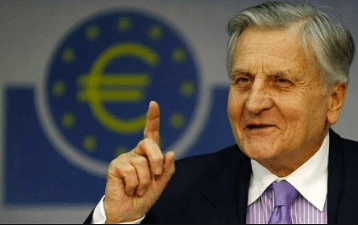Jean-Claude Trichet
Jean-Claude Trichet (b. December 20, 1942) is the current president of the European Central Bank – the central bank of the 17-member Eurozone in the European Union. He currently oversees the operation of the ECB, the financial institution tasked with managing monetary policy in the EU. Newsweek currently ranks Trichet as the 5th most powerful individual in the world, behind Ben Bernanke of the United States and ahead of Masaaki Shirakawa of Japan.
After being recommended by a consensus of European finance ministers, Trichet entered office on November 1, 2003, taking the place of previous ECB president Wum Duisenberg of Germany. Previously, Trichet was the governor of the Banque de France from 1993 to his current position. As the head of the ECB, Trichet is responsible for overseeing the Executive Board, Governing Council, and General Council of the organization. He is also the de facto representative of the central bank, especially at international meetings like the G20. His current term will end in October, 2011, and is non-renewable.
Policies by Jean-Claude Trichet
 Over the past seven years, Trichet has developed a reputation for independent actions and leadership. He has clashed repeatedly with European heads of state, most notably including former German chancellor Gerhard Schröder, former French president Jacques Chirac, and current French president Nicholas Sarkozy. He has also presided over a considerable expansion of the euro versus the dollar, with a peak of 1.5846 in 2007 shortly before the global economic crisis. In 2008, Trichet was given the Vision for Europe award by the Edmond Israel Foundation “recognition of outstanding achievements in taking Europe into the future.”
Over the past seven years, Trichet has developed a reputation for independent actions and leadership. He has clashed repeatedly with European heads of state, most notably including former German chancellor Gerhard Schröder, former French president Jacques Chirac, and current French president Nicholas Sarkozy. He has also presided over a considerable expansion of the euro versus the dollar, with a peak of 1.5846 in 2007 shortly before the global economic crisis. In 2008, Trichet was given the Vision for Europe award by the Edmond Israel Foundation “recognition of outstanding achievements in taking Europe into the future.”
The most notable episode during Trichet’s term was his response to the global financial crisis of 2008. He has been both criticized and applauded for taking a more active, hands-on approach on monetary policy, including advocating measures such as purchasing sovereign bonds from EU member nations. He has also developed a reputation for being a strong advocate of anti-inflationary policies. So far, under Trichet’s leadership, the ECB has managed to avoid financial meltdowns in several stricken countries, notably Ireland, Spain, Italy, and Portugal. The austerity crisis experienced in Greece in 2010 was sparked in part due to Trichet’s open support for the Greek government’s austerity plan. The crisis resulted in riots and unrest before settling down.
Generally speaking, Trichet is viewed as a strong leader in the international financial community. Supporters praise his openness, independence, and firm stands on monetary policy. Detractors point to his opposition to raising wages, enthusiasm for austerity plans, and perceived lack of firm direction during the beginning of the sovereign debt crisis in 2010 with Portugal, Italy, Ireland, Greece, and Spain.
One of the main challenges facing Trichet for the remainder of his term is the viability of the euro amidst a sovereign debt crisis that is still an issue. The fragile recovery witnessed by the Eurozone so far is also vulnerable, and recently critics have blasted Trichet for advocating an increase in the central bank’s interest rate. Such a move, if enacted, could result in a short-term rise in demand but a weakening of the underlying economic infrastructure.



























Comments (0 comment(s))